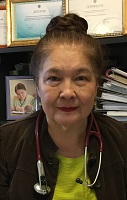NUGMANOVA, Prof Damilya
President, Kazakhstan Association of Family Physicians

What work do you do now?
As a president of Kazakhstan Association of Family Physicians (KAFP) I’ve become a resource person for the Ministry of Health (MOH), Republican Center for Health Development, and regional health authorities. I try to develop, improve, and promote my specialty in my country. I take part in the discussions at the MOH of regulatory documents for primary health care (PHC) and the entire healthcare system. Also we invite MOH representatives to our congresses to discuss problems of the work of family doctors.
I’m trying to improve the working conditions of PHC doctors as well as payment system. I’m managing two primary health care projects and I’m a part-time Family Medicine (FM) professor at West Kazakhstan Medical University.
What has your involvement been in the development of Family Medicine in Central Asia?
In February 1996, I organised the Kazakhstan Family Medicine Faculty of Almaty State Postgraduate Institute for Physicians (a first in my country). Other FM Faculties were opened in September 1998 with my assistance.
In 1995-2005 being a Clinical Director of several USAID funded health reform projects and a consultant to the World Bank and DFID PHC Project, I actively participated in all health care reforms aiming to develop PHC, establish FM, develop a new per capita payment system, implement EBM, improve health education, and other health reforms in Kazakhstan, Uzbekistan, Tajikistan, and other Central Asia Republics (CAR).
During the last 25 years our specialty has experienced difficult times including: the prohibition to practice FM in Kazakhstan with converting trained Family Doctors back to Pediatricians and Internists (2001-2004); restoring separate polyclinics for adults, children, pregnant women, while closing independent FM practices and most FM faculties (2002-2005); and cancelling FM residency in 2012. Colleagues in other CARs had the same problems. To oppose such periods of denial of FM I tried to keep KAFP as a NGO with its voice, and support my colleagues. We did many advocacy campaigns for FM, for primary health care, and against closing family group practices.
Having support from UK and US colleagues, in 1997, my colleagues and I started the first FM residency program, developed a new curriculum, and prepared the first 12 family doctors. In 2000-2002 I actively participated in the two year-long training programs for FM trainers. These two cohorts of 28 trainers became the core of the KAFP.
In 2003-2007 a team of FM trainers and I provided the very first EBM training courses for Kyrgyzstan, Uzbekistan, Turkmenistan, and Kazakhstan academic specialists. Many other new technologies were introduced in CAR in those years. I’m happy to be a part of these new changes in medicine practice, delivery, and management in Kazakhstan and CAR.
In 2003 KAFP became a WONCA full member and support many WONCA activities.
What is it like to be a family doctor in Kazakhstan?
It is difficult to be a family doctor in Kazakhstan. Most doctors have poor work conditions without a permanent assigned room, desk, or computer. There are crowded patient examining rooms where the doctor shares one room with 2-4 nurses, who have to see other patients simultaneously. There are crowded corridors, absence of privacy, slow Internet, incompatible electronic health systems and data bases. On top of this, there are controversial regulatory documents, a lot of official visitors from many organisations, well-developed punishment and financial penalty systems, and a low salary.
Experienced doctors are welcomed to the private clinics, and most go there. Young doctors leave medicine often. Medical schools are rushing to produce more and more GPs. It’s a vicious circle.
Our profession is underestimated by government, patients, and society in whole. People think that they can blame us as individuals for all health system and population health problems. But some regions of Kazakhstan (where we have most active KAFP members) can survive, resist, and demonstrate good family practice.
Your interests at work and privately.
Managing two pilot rural projects, I want to improve working conditions for family doctors and their nurses, create incentives for continues professional education, develop a culture of patient privacy, improve health worker- patient communication, increase patients’ involvement, and demonstrate the advantages of my specialty and well-organised primary care.
I love to spend time with children. While not having my own grandchildren, I spend my vacations with my nephew’s children who live in another country. I believe in a crucial role of grandparents in the life of children.